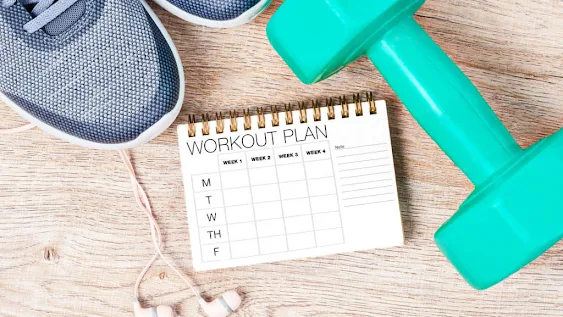Staying disciplined in your workouts can be one of the toughest challenges for anyone pursuing fitness. It’s easy to start strong with big goals, but without the right strategies, consistency can falter as motivation fades. However, building discipline in your workout routine is the key to long-term success, whether you’re aiming to lose weight, build muscle, or simply improve your overall health.
This guide will show you how to develop the discipline needed to maintain consistent workouts, regardless of your fitness level or goals. By following these steps, you’ll not only achieve your fitness aspirations but also build habits that last a lifetime.
1. Set Clear and Realistic Goals
The foundation of workout discipline starts with clear and realistic goals. If your goals are too vague or overly ambitious, it’s easy to lose focus or become discouraged. Setting achievable targets ensures that you have something tangible to work toward, which helps maintain consistency.
The SMART Goal Framework
A proven method for setting effective fitness goals is the SMART framework, which stands for:
- Specific: Clearly define what you want to achieve. Instead of “I want to get fit,” specify, “I want to run a 5K in under 30 minutes.”
- Measurable: Make sure you can track your progress. For example, “I will run 3 times a week.”
- Achievable: Set a goal that is challenging but attainable based on your current fitness level.
- Relevant: Your goal should be important to you personally, not something you feel obligated to achieve.
- Time-bound: Give yourself a deadline to create urgency. For instance, “I will run a 5K in three months.”
Tip: Break larger goals into smaller milestones. Each small success builds momentum and keeps you motivated to continue.
2. Create a Workout Schedule You Can Stick To
Consistency is the cornerstone of fitness discipline, and the best way to ensure consistency is by creating a realistic and sustainable workout schedule. Your schedule should fit into your lifestyle without overwhelming you, so you don’t feel burnt out.
How to Build a Sustainable Routine
- Start small: If you’re new to working out or returning after a long break, don’t overcommit. Begin with 2-3 days a week, and gradually increase your frequency as you build stamina and confidence.
- Time of day matters: Choose a time that works best for your energy levels and daily routine. Some people perform better with morning workouts, while others thrive in the evening.
- Plan ahead: Block out specific times for your workouts in your calendar, just like you would for any important meeting or appointment.
Tip: Use workout apps or reminders to keep you accountable and ensure you don’t skip workouts.
3. Develop a Positive Mindset
One of the biggest obstacles to workout discipline is your mindset. Discipline requires a shift from relying solely on motivation to embracing habits, even when you don’t feel like it. A positive mindset helps you push through tough days and keep going even when your motivation fades.
Mind Over Matter
You won’t always feel motivated to work out, and that’s okay. What sets disciplined people apart is their ability to exercise despite feeling unmotivated. This is where your mindset becomes crucial. Think of workouts as non-negotiable parts of your day rather than optional activities.
- Tip: Focus on the process, not just the outcome. Celebrating the act of showing up and working out, even if the session wasn’t perfect, builds discipline over time.
Change Your Self-Talk
Pay attention to how you speak to yourself when you're tempted to skip a workout. Negative self-talk (“I’m too tired,” or “I’ll just skip today”) can derail your efforts. Instead, use positive affirmations that encourage discipline and action.
- Tip: Use phrases like “I am committed to my fitness” or “I’m stronger every time I show up” to reinforce your discipline.
4. Track Your Progress
Tracking your progress is a powerful way to stay disciplined. When you can see the results of your hard work, it boosts your motivation and keeps you committed to your routine.
Methods for Tracking Progress
- Keep a workout journal: Write down what exercises you did, how long you worked out, and how you felt during and after the workout. This can help you identify patterns and celebrate progress.
- Use fitness apps: Apps like MyFitnessPal, Strava, or Fitbit can help track your workouts, steps, calories burned, and overall progress.
- Track physical changes: Take progress photos or measurements to see the physical changes in your body over time.
Tip: Set aside time each week to review your progress. Reflecting on how far you’ve come can inspire you to keep moving forward.
5. Find Accountability and Support
Discipline becomes easier when you’re not going at it alone. Having accountability, whether from a workout partner, a coach, or a fitness community, provides external motivation and encouragement to stay consistent.
The Power of Accountability Partners
Working out with a partner helps hold you accountable, as you’re less likely to skip a workout when someone else is counting on you to show up. It also adds a social aspect to your fitness routine, making it more enjoyable.
- Tip: Join a fitness class or community to find like-minded individuals who share your goals. Group classes create a sense of camaraderie and shared progress.
Hire a Personal Trainer
If you struggle with self-discipline, a personal trainer can offer the guidance, support, and accountability you need. Trainers can create personalized workout plans tailored to your goals, track your progress, and push you to stay consistent.
Tip: If hiring a trainer isn’t an option, consider joining an online fitness program or community to stay motivated.
6. Prepare for Setbacks and Stay Flexible
Even with the best plans, setbacks happen—whether it’s an injury, a busy work schedule, or simply feeling unmotivated. How you handle these setbacks determines whether you stay disciplined in the long run.
Stay Flexible
Instead of letting a missed workout derail your entire fitness journey, allow yourself some flexibility. One missed workout or a less-than-perfect week doesn’t mean you’ve failed. The key is to get back on track as soon as possible.
- Tip: Focus on progress, not perfection. Embrace the idea that consistency over time matters more than perfection in the short term.
Adjust Your Goals When Necessary
Sometimes, life gets in the way, and you may need to adjust your goals to reflect your current situation. This doesn’t mean giving up—it’s about being realistic and adapting when needed to maintain your overall commitment to fitness.
- Tip: If your schedule gets busier than expected, adjust your workout routine to fit in shorter but more frequent sessions, like 20-minute HIIT workouts.
7. Reward Your Consistency
Recognizing and rewarding your effort can reinforce your workout discipline. Celebrating your progress—even small wins—can help maintain your motivation and build momentum.
Set Milestone Rewards
Establish rewards for hitting specific milestones in your fitness journey. Whether it’s completing a month of consistent workouts or reaching a personal best, treating yourself to something you enjoy can encourage further discipline.
- Tip: Choose rewards that align with your fitness goals. For example, treat yourself to a new piece of workout gear or a relaxing massage after reaching a fitness milestone.
Embrace Non-Scale Victories
Fitness isn’t always about the numbers on the scale. Recognize non-scale victories, such as improved endurance, better sleep, or increased energy levels. These improvements are just as important as physical changes and should be celebrated.
Tip: Keep a gratitude journal where you write down all the positive ways your fitness journey is impacting your life.
Conclusion: Mastering Discipline for Long-Term Success
Discipline is the cornerstone of success in any fitness journey. While motivation may come and go, developing the discipline to show up consistently will ensure that you achieve your goals over time. By setting clear goals, building a sustainable routine, maintaining a positive mindset, and tracking your progress, you’ll build the habits necessary to stay consistent in your workouts.
Remember, discipline isn’t about being perfect; it’s about showing up even when you don’t feel like it. The more you practice discipline, the more it becomes ingrained in your daily routine, leading to long-term success and a healthier, happier you.
















0 Comments